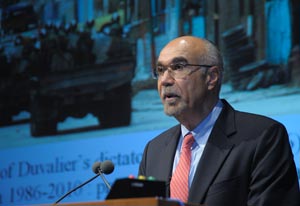Research has resumed in Haiti, following quake
August 2010 | Volume 9, Issue 4
Despite January’s devastating earthquake, research is again underway in Haiti, thanks to the efforts of longtime Fogarty grantee, Dr. Jean “Bill” Pape. He addressed the NIH community recently while in town to accept the 2010 Gates Award for Global Health on behalf of GHESKIO - the world’s first HIV/AIDS organization - which he founded nearly 30 years ago and still directs.

Photo by Bill Branson
Longtime Fogarty grantee Dr. Jean ‘Bill’ Pape
visited NIH to report his center’s HIV/AIDS
research has resumed in full, just months after
Haiti’s devastating earthquake.
Though still facing numerous challenges, he reports GHESKIO has been able to resume nearly all of its studies. Immediately after the disaster, Pape and his team had stopped research efforts to provide care for about 7,000 homeless people camped on and near its campus in downtown Port-au-Prince. They provided emergency surgery and rehabilitation care to scores more, scaled-up tuberculosis screening and treatment, and continued HIV services for 22,000 patients.
GHESKIO, known by the French acronym for the Haitian Group for the Study of Kaposi’s Sarcoma and Opportunistic Infections, has provided continuous, free medical care in Haiti since 1982.
Most notably, the GHESKIO team helped lower the prevalence of HIV in the population by more than half, from 6.2 to 2.2 percent. With support from NIH and other funders, GHESKIO has pursued a three-pronged approach, leveraging the synergy of training, research and service delivery.
“Capacity building has been essential and research has been the cornerstone of that,” Pape said. “Clearly, without this, there is no way we could have coped with the earthquake.”
A Haitian physician, Pape graduated from Weill Cornell Medical College in 1975 and returned to Haiti in 1979. His research collaborations with colleagues at Cornell have been ongoing.
Pape has dreams for Haiti’s future. “Our new focus is to transform the tent cities into model global health villages,” he said, “with an emphasis on health and nutrition, microcredits and job creation, vocational school, maternal and primary school and overall, better habitats for the community.”
This event was sponsored by Fogarty, the National Institute of Allergy and Infectious Diseases and the NIH Office of AIDS Research.
More Information
To view Adobe PDF files,
download current, free accessible plug-ins from Adobe's website.